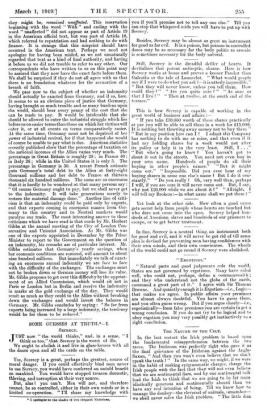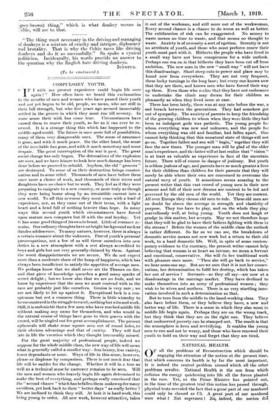BOMB GUESSES AT TRUTIL*—I.
SECRECY.
JUST now " the world thinks," and, in a sense, " I think so too," that-Secrecy is the worst of ills. We ought to abolish it and hve in glass-houses with all the doors open and all the cards on the. table.
Yes, Secrecy is a great, perhaps the greatest, source of moral danger. If you could effectively bind men never to use Secrecy, you would have conferred an untold benefit on mankind. You would have stopped treason domestic, thieving, and Corruption at their very source. But, alas I you can't. Men will not, and therefore cannot, be so controlled, either in their own minds or in a
limited co-operation. " share my knowledge with
• -I apologIro w tto shades of two eloquent Yktorntne.
you if you'll promise not to tell any one else." Till you can stop that whispered aside you will have to put up with Secrecy.
Besides, Secrecy may be almost as great an instrument for good as for evil. It is a poison, but poisons in controlled doses may be as necessary for the body politic as arsenic is sometimes necessary for the body natural.
Still, Secrecy is the dreadful defiler of hearts. It devitalizes that potent antiseptic, shame. Here is how Secrecy works at home and proves a keener Pandar than Galeotto or the tale of Launeelot. " What would people say if I were to do what you ask ?—it is utterly impossible." " But they will never know, unless you tell them. How could they ? " " Are you quite sure ? " " As sure as that I live " " Then at twelve, at the south end of the terrace."
This is how Secrecy is capable of working in the great world of business and affairs :—
" If you take £10,000 worth of these shares practically at par you will be able to sell them in a week for £15,000. It is nothing but throwing away money not to buy them " " But in my position how can I ? I admit this Company has nothing to do with me or mine, and that even if it had my holding shares for a week would not alter its policy or help it in the very least. Still, I . . ." " But who's going to know ? You haven't got to shoat it out in the streets. You need not even buy in your own name. Hundreds of people do all their buying in other people's names." " But it might come out." " Impossible. Did you ever hear of my buying shares in some one else's name 1 But I do it con- stantly." " Do you really ? Oh, very well then, perhaps I will, if you are sure it will never come out. But, I say, why not £20,000 while we are about it?" " All right. I will tell my Brokers :—in what name shall we put them 3 "
Yet look at the other side. - How often a good cause gets secret help from people whose hearts are touched but who dare not come into the open. Secrecy helped hun- dreds of American slaves and hundreds of our prisoners to escape, or to get better treatment.
In fine, Secrecy is a neutral thing, an instrument both for good and evil, and it will never be got rid of till some plan is devised for preventing men having confidences with their own minds, and their own consciences. The wheels of the world could not go round if Secrecy were abolished.
" ERG OTLSMS- ."
" Natural parts and good judgments rule the world. States are not governed by ergotisms. Many have ruled well, who could not, perhaps, define a commonwealth ; and they who understand not the globe of the earth, command a great part of it." I agree with Sir Thomas Browne. And quaintly enough it is Ergotism—i.e., Logic— that makes ire agree. lo:publio affairs your premisscs are almost always doubtful. You have to guess then), and you often guess wrong. But if you argue closely—i.e., ergotiatically—from false premieres you are certain to get a wrong conclusion. If you do not try to be logical and to obey ergotism you may very possibly get instinctively to a right conclusion.
THE NATURE OF THE CELT.
In the last reatort the Irish problem is based upon the fundamental misapprehension between the two races. The Irishman was perfectly right who gave it as the final grievance of the Irishman against the Anglo- Saxon, " And than you won't even believe that we don't speak the truth I " In the same way, we might, if we were in the habit of making epigrammatic charges, charge the Irish people with the fact that they will not even believe that we are sentimental liars, and by our sentimental talk lead the Irish to think that we are going to be far more idiotically generous and sentimentally absurd than we have any real intention of being.. Till we know how to manage the donkey—the cleverest of animals, i emember- we shall never solve the Irish problem. " The little dun. :grey-brown) thing," which is what donkey means in :!eltic, will see to that.
"The thing most necessary in the driving and managing of donkeys is a mixture of cruelty and intrigue, diplomacy and brutality. That is why the Celtic races like driving donkeys and do it so successfully." So spoke a cynical politician. Incidentally, his words provide an answer to the question why the English hate driving donkeys. IGNOWS. (To be con( int, ed.)



































 Previous page
Previous page